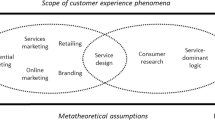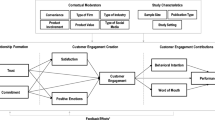Abstract
While emotions have been shown to be significant determinants of various consumer behaviors, the antecedents of these emotions have not received much attention in the marketing literature. The current research examines a cognitive model of emotion and uses an experiment to show that the appraisals of goal relevance, goal congruence, and coping potential are determinants of consumption emotions such as anger, sadness, and joy/satisfaction. These emotions are also shown to be determinants of postconsumption behaviors such as word-of-mouth intentions.
Similar content being viewed by others
References
Aaker, David A., Douglas M. Stayman, and M. R. Hagerty. 1986. “Warmth in Advertising: Measurement, Impact and Sequence Effects.”Journal of Consumer Research 12 (March): 365–381.
Arnold, M. B. 1960.Emotion and Personality. 2 vols. New York: Columbia University Press.
Bagozzi, Richard P. 1992. “The Self-Regulation of Attitudes, Intentions, and Behavior.”Social Psychology Quarterly 55 (2): 178–204.
————— and Youjae Yi. 1989. “On the Use of Structural Equation Models in Experimental Designs.”Journal of Marketing Research 26 (August): 271–284.
Burke, Marian C. and Julie A. Edell. 1989. “The Impact of Feelings on Ad-Based Affect and Cognition.”Journal of Marketing Research 26 (February): 69–83.
Cadotte, Ernest R., Robert B. Woodruff, and Roger L. Jenkins. 1987. “Expectations and Norms in Models of Consumer Satisfaction.”Journal of Marketing Research 24 (August): 305–314.
Cattell, Raymond B. 1960. “The Dimensional (Unitary Component) Measurement of Anxiety, Excitement, Stress and Other Mood Reaction Patterns.” InDrugs and Behavior. Eds. L. Uhr and J. G. Miller. New York: John Wiley, 438–461.
Clore, Gerald L., Andrew Ortony, and Mark A. Foss. 1987. “The Psychological Foundations of the Affective Lexicon.”Journal of Personality and Social Psychology 53 (4): 751–766.
Day, Ralph L. 1983. “The Next Step: Commonly Accepted Constructs for Satisfaction Research.” InInternational Fare in Consumer Satisfaction and Complaining Behavior. Eds. Ralph L. Day and Keith H. Hunt. Bloomington: Indiana University Press, 113–117.
Edell, Julie A. and Marian C. Burke. 1987. “The Power of Feelings in Understanding Advertising Effects.”Journal of Consumer Research 14 (December): 421–433.
Frijda, Nico H. 1986.The Emotions. Cambridge, UK: Cambridge University Press.
————— 1993. “The Place of Appraisal in Emotion.”Cognition and Emotion 7 (3–4): 115–143.
Gardner, Meryl P. 1985. “Mood States and Consumer Behavior: A Critical Review.”Journal of Consumer Research 12 (December): 281–300.
Holbrook, Morris B. and Rajeev Batra. 1987. “Assessing the Role of Emotions as Mediators of Consumer Responses to Advertising.”Journal of Consumer Research 14:404–420.
————— and Elizabeth C. Hirschman. 1982. “The Experiential Aspects of Consumption: Consumer Fantasies, Feelings and Fun.”Journal of Consumer Research 9 (September): 132–140.
—————, John O’Shaughnessy, and Stephen Bell. 1990. “Action and Reaction in the Consumption Experience: The Complimentary Roles of Reasons and Emotions in Consumer Behavior.”Research in Consumer Behavior 4:131–163.
Izard, Carroll E. 1993. “Four Systems for Emotion Activation: Cognitive and Noncognitive Processes.”Psychological Review 100 (January): 68–90.
Kemper, T. D. 1978.A Social Interactional Theory of Emotions. New York: John Wiley.
Lazarus, Richard S. 1974.The Riddle of Man. Englewood Cliffs, NJ: Prentice Hall.
————— 1991.Emotion and Adaptation. New York: Oxford University Press.
Oliver, Richard L. 1989. “Processing of the Satisfaction Response in Consumption: A Suggested Framework and Research Propositions.”Journal of Consumer Satisfaction/Dissatisfaction and Complaining Behavior 2: 1–16.
Omdahl, Becky Lynn. 1995.Cognitive Appraisal, Emotion, and Empathy. Mahwah, NJ: Lawrence Erlbaum.
Ortony, Andrew, Gerald L. Clore, and Allan Collins. 1988.The Cognitive Structure of Emotions. Cambridge, UK: Cambridge University Press.
Petty, Richard E. and John T. Cacioppo. 1981. “Issue Involvement as Moderator of the Effects on Attitude of Advertising Content and Context.” InAdvances in Consumer Research. Vol. 8. Ed. Kent B. Monroe. Ann Arbor, MI: Association for Consumer Research, 20–24.
Plutchik, Robert. 1980.Emotions: A Psychoevolutionary Synthesis. New York: Harper & Row.
Richins, Marsha L. and Peter H. Bloch. 1986. “After the New Wears Off: The Temporal Context of Product Involvement.”Journal of Consumer Research 13 (September): 280–285.
Roseman, Ira. 1984. “Cognitive Determinants of Emotion: A Structural Theory.” InReview of Personality and Social Psychology: Vol. 5. Ed. P. Shaver. Beverly Hills, CA: Sage, 11–36.
Russell, James A. 1980. “A Circumplex Model of Affect.”Journal of Personality and Social Psychology 39: 1161–1178.
Scherer, Klaus R. 1984. “On the Nature and Function of Emotion: A Component Process Approach.” InApproaches to Emotion. Eds. K. R. Scherer and P. Ekman. Hillsdale, NJ: Lawrence Erlbaum, 293–317.
————— 1993. “Studying the Emotion-Antecedent Appraisal Process: An Expert System Approach.”Cognition & Emotion 7 (3–4): 325–355.
Shaver, Phillip, Judith Schwartz, Donald Kirson, and Cary O’Connor. 1987. “Emotion Knowledge: Further Exploration of a Prototype Approach.”Journal of Personality and Social Psychology 52 (6): 1061–1086.
Sirgy, Joseph M. 1984. “A Social Cognition Model of CS/D: An Experiment.”Psychology and Marketing 1 (Summer): 27–44.
Smith, Craig A. and Phoebe C. Ellsworth. 1985. “Patterns of Cognitive Appraisal in Emotion.”Journal of Personality and Social Psychology 48 (4): 813–838.
Watson, David and Auke Tellegen. 1985. “Toward a Consensual Structure of Mood.”Psychological Bulletin 98 (2): 219–235.
Westbrook, Robert A. 1987. “Product/Consumption Based Affective Responses and Post Purchase Processes.”Journal of Marketing Research 24 (August): 258–270.
————— and Richard L. Oliver. 1991. “The Dimensionality of Consumption Emotion Patterns and Consumer Satisfaction.”Journal of Consumer Research 18 (June): 84–91.
Zaichkowsky, Judith L. 1985. “Measuring the Involvement Construct.”Journal of Consumer Research 12 (December): 341–352.
Zajonc, R. B. 1980. “Feeling and Thinking: Preferences Need No Inferences.”American Psychologist 35: 151–175.
————— 1984. “On the Primacy of Affect.”American Psychologist 39: 117–123.
Author information
Authors and Affiliations
Additional information
His research interests include consumption emotions, complaining behavior, cognitive models of emotion, and covariance structure modeling.
Rights and permissions
About this article
Cite this article
Nyer, P.U. A study of the relationships between cognitive appraisals and consumption emotions. J. of the Acad. Mark. Sci. 25, 296–304 (1997). https://doi.org/10.1177/0092070397254002
Issue Date:
DOI: https://doi.org/10.1177/0092070397254002




